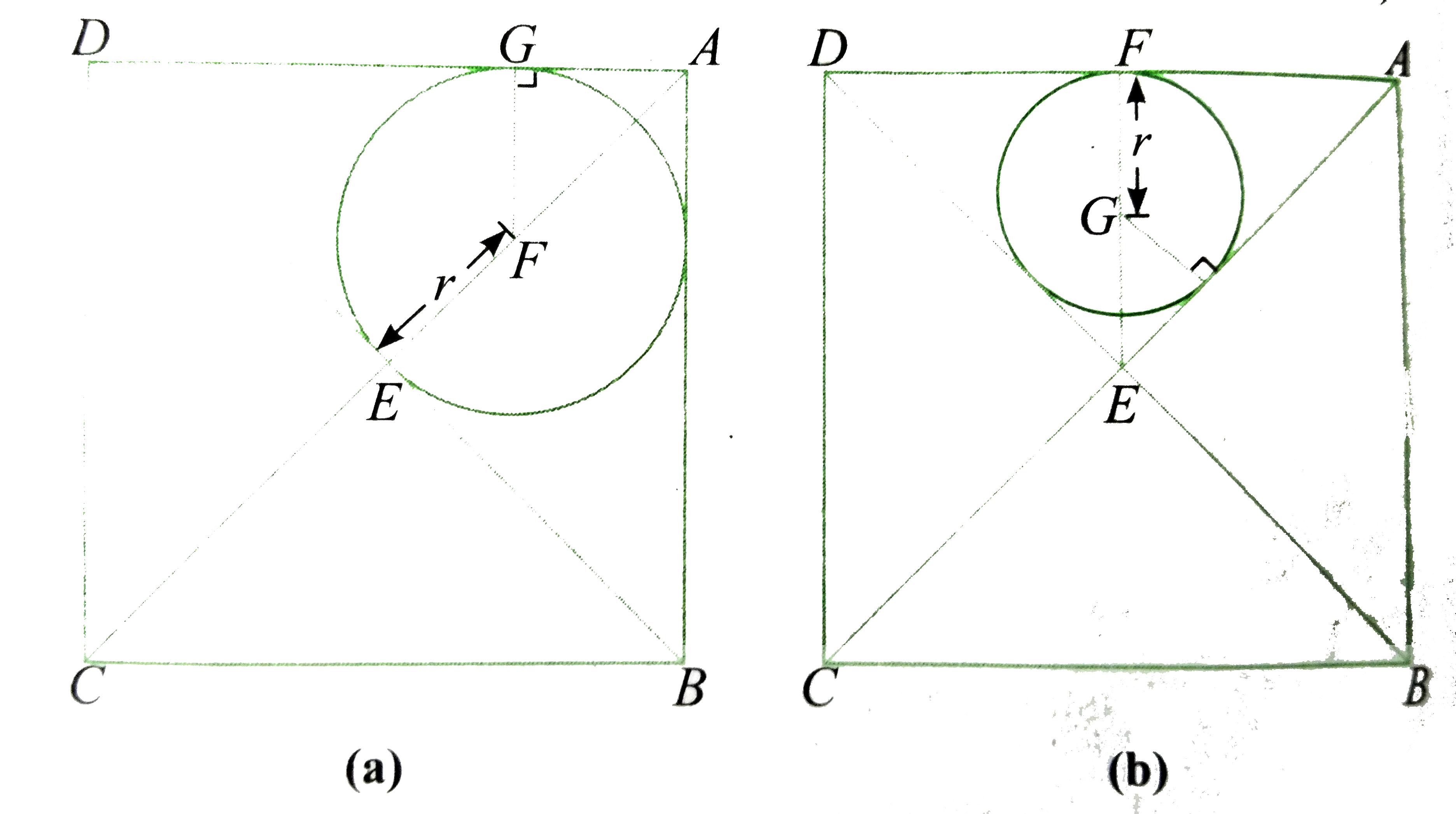Each side of a square has length 4 units and its center is at (3,4). If one of the diagonals is parallel to the line y=x, then anser the following questions.
The radius of the circle inscribed in the triangle formed by any three vertices is
2√2(√2+1)
2√2(√2−1)
2(√2+1)
none of these
The correct Answer is:2
It is given that one of the diagonals of the square is parallel to the line y=x
Also, the length of the diagonal of the square is 4√2
Hence, the equation of one of the diagonals is
x−31/√2=y−41/√2=r=±2√2
Hence, x−3=y−4=±2
or x=5,1 and y=6,2
Hence, two of the vertices are (1,2) and (5,6)
The other diagonal is parallel to the line y=−x , so that its equation is
x−3−1/√2=y−41/√2=r=±2√2
Hence, the two vertices on this diagonal are (1,6) and (5,2)

AB=4,AC=4√2
∴AE=2√2
In first figure, EF+FA=AE
or r+√2r=2√2
or r=2√2√2+1=2√2(√2−1)
In second figure, EG+FG=EF
or √2r+r=2
or r=2√2+1=2(√2−1)
Topper's Solved these Questions
- CIRCLE BOOK - CENGAGECHAPTER - CIRCLE EXERCISE - MATRIX MATCH TYPE
6 Videos
- CIRCLE BOOK - CENGAGECHAPTER - CIRCLE EXERCISE - Exercise (Matrix)
1 Videos
- CIRCLE BOOK - CENGAGECHAPTER - CIRCLE EXERCISE - Exercise (Multiple)
25 Videos
- BINOMIAL THEORMBOOK - CENGAGECHAPTER - BINOMIAL THEORMEXERCISE - Question Bank
31 Videos
- CIRCLESBOOK - CENGAGECHAPTER - CIRCLESEXERCISE - Question Bank
32 Videos
Similar Questions
A square has sides of length 4 units each with its centre at (3, 4). If one of its diagonals is parallel to the line y = x, find its vertices.
View SolutionEach side of a square of length 6 and its centre is at the point (4,5). If one of its diagonals is parallel to the line y=x then the co ordinates of the vertics of the square are……………….
View Solution
Knowledge Check
Each side of a square has length 4 units and its center is at (3,4). If one of the diagonals is parallel to the line y=x, then anser the following questions.
A2(√2−1)B2(√2+1)C√2(√2−1)Dnone of these
Linked Comprehension Type Based upon each paragraph, three multiple choice questions have to be answered. Each question has four choices: a, b, c, and d, out of which only one is correct For Problems 1-3 center is at Each side of a square has length 4 units and its (3, 4). If one of the diagonals is parallel to the line y x, then answer the following questions 1. Which of the following is not the vertex of the square? a. (1, 6) b. (5, 2) c. (1, 2) d. (4, 6) 2. The radius of the circle inscribed in the triangle formed by any three vertices is a. 2020V2 1) 2012 1) d. none of these 3. The circle inscribed in the triangle forme radius of the by any two vertices of the square and the center is b. 202 1) a. 2012 1) d. none of these v2012 1) For Problems 4-6 Tangents PA and PB are drawn to the circle (x 4) 4 from the point P on the curve y sin x, where A and B on the circle. Consider the function y f(r) represented by locus of the center of the circumcircle of triangle PAB. T answer the following questions
View SolutionEach side of a square is of length 6 units and the centre of the square Is ( - 1, 2). One of its diagonals is parallel to x+y=0. Find the co-ordinates of the vertices of the square.
View SolutionEach side of a square is of length 6 units and the centre of the square Is ( - 1, 2). One of its diagonals is parallel to x+y=0. Find the co-ordinates of the vertices of the square.
View SolutionEach side of a square is of length 4. The center of of the square is (3,7) and are of its disgonals are parallel to y=x. Then coordinates of the vertices are?
View SolutionThe equation of the circle inscribed in the triangle formed by line x=0,y=0,3x−4y+6=0 is ...........
View SolutionWrite the coordinates of the center of the circle inscribed in the square formed by the lines x=2, x=6, y=5 and y=9.
View SolutionThe radius of the circle passing through the vertices of the triangle formed by the lines x+y=2,3x−4y=6,x−y=0
View Solution
